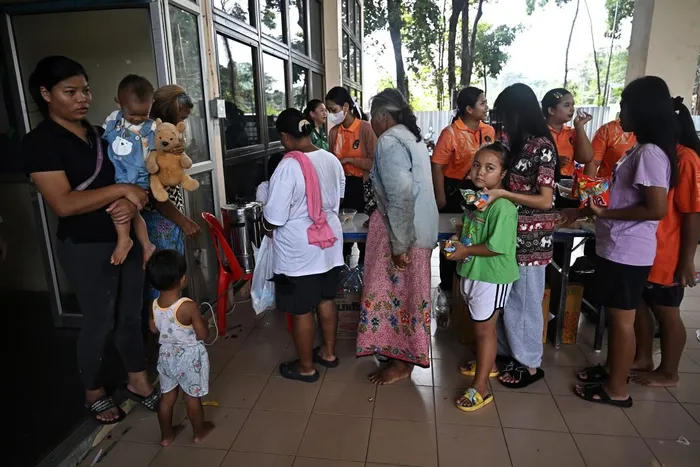Thailand and Cambodia's deadly border dispute: What We Know

Evacuees line up for food they take shelter in a gymnasium on the grounds of Surindra Rajabhat University in the Thai border province of Surin on July 25, 2025. More than 100,000 people have fled the bloodiest border fighting between Thailand and Cambodia in a decade, Bangkok said on July 25, as the death toll rose rises and international powers urged a halt to hostilities. (Photo by Lillian SUWANRUMPHA / AFP
Image: AFP
Thailand said on Friday it has evacuated more than 100,000 people along the Cambodian border as the two countries fight their bloodiest military clashes in over a decade.
The interior ministry said 100,672 people from four border provinces had been moved to shelters, while the health ministry announced that the death toll had risen to 14.
Thailand launched air strikes on Cambodian military targets on Thursday as Cambodia fired rockets and artillery, in a sharp escalation of a long-running border dispute.
The two countries are locked in a bitter feud over parts of the Emerald Triangle, where their borders meet Laos and several ancient temples stand.
How did it start?
The territorial row has dragged on for decades, but the latest flare-up between the two countries began with military border clashes in May that left one Cambodian soldier dead.
Since then, the two sides have hit each other with retaliatory measures, with Thailand restricting border crossings and Cambodia halting certain imports.
Five members of a Thai military patrol were wounded by a landmine blast on Wednesday in the Nam Yuen district of northeastern Ubon Ratchathani province, according to the Thai army.
The Thai Ministry of Public Health said Thursday that at least 11 civilians had been killed in cross-border strikes by Cambodia.
A spokesperson for Cambodia's defence ministry declined to comment on Thursday when asked about casualties on its side.
What happened?
The conflict blazed on Thursday as Cambodia fired rockets and artillery into Thailand, and Thai F-16s carried out strikes on two Cambodian military targets, officials said.
A Cambodian shell hit a Thai house, killing one civilian and wounding three, including a five-year-old.
The clashes erupted near two temples on the border between the Thai province of Surin and Cambodia's Oddar Meanchey, with both sides trading blame.
Thailand condemned Cambodia as "inhumane, brutal and war-hungry", accusing it of targeting homes and civilian infrastructure.
What is the state of diplomacy?
The violence came hours after Thailand expelled the Cambodian ambassador and recalled its own envoy in protest after the landmine injuries.
Thailand's embassy in Phnom Penh urged its nationals to leave Cambodia "as soon as possible" unless they had urgent reasons to remain.
Cambodian Prime Minister Hun Manet on Thursday requested the UN Security Council convene an "urgent meeting" to address what his foreign ministry called "unprovoked military aggression".
China, a close ally of Cambodia, said it was "deeply concerned" about the clashes, calling for dialogue.
Anwar Ibrahim, the prime minister of Malaysia, which currently chairs the Association of Southeast Asian Nations, called on its fellow ASEAN members, Thailand and Cambodia, to "stand down".
Thai political crisis?
The border dispute has also triggered a domestic political crisis in Thailand, where Prime Minister Paetongtarn Shinawatra was suspended from office pending an ethics probe over her conduct.
In an attempt to defuse the row, Paetongtarn held a diplomatic call with Hun Sen, Cambodia's former longtime ruler and father of Cambodian Prime Minister Hun Manet.
The phone call was leaked from the Cambodian side last month, sparking a judicial investigation.
Cambodia's future conscripts?
Hun Manet announced this month that Cambodia would start conscripting civilians next year, activating a long-dormant mandatory draft law.
He cited rising tensions with Thailand for the decision.
Cambodia's conscription law dates back to 2006 but has never been enforced.
Hun Manet has proposed conscripts serve for two years to bolster the country's 200,000 personnel, requiring citizens aged 18 to 30 to enlist in the military.
AFP
Related Topics: